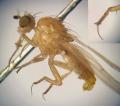Diptera.info :: Miscellaneous :: General queries
|
Tachinidae parasites of of the pentatomid bug Picromerus bidens ?
|
|
| Dmitry_Musolin |
Posted on 12-04-2011 12:50
|
|
Member Location: Posts: 6 Joined: 12.04.11 |
Dear colleagues, I would appreciate any information (records, species names, references) concerning Tachinidae (Phasiinae) parasites of ADULTS (or nymphs + adults) of the pentatomid bug Picromerus bidens (Heteroptera: Pentatomidae) within its Palaearctic range: What species can be parasites of adults of this bug? Thank you very much in advance! All the best, Dmitry. Dmitry Musolin, PhD, musolin@gmail.com, Senior Research Fellow, Department of Entomology Faculty of Biology and Soil Sciences, St. Petersburg State University Universitetskaya nab., 7/9, St. Petersburg, 199034, RUSSIA In English: www.ndsu.nodak.edu/ndsu/rider/Pentatomoidea/Researchers/Musolin_Dmitry.htm "Seasonal Development of Aquatic and Semiaquatic True Bugs (Heteroptera)" www.unipress.ru/2007/sau.html; available at: http://www.pemberleybooks.com/ |
|
|
|
| ChrisR |
Posted on 12-04-2011 12:59
|
|
Super Administrator Location: Reading, England Posts: 7706 Joined: 12.07.04 |
Matt Smith & I have checked out UK records and can't find anything for that species of host - sorry  Have you reared out many phasiines from bugs already? Edited by ChrisR on 12-04-2011 13:00 Manager of the UK Species Inventory in the Angela Marmont Centre for UK Biodiversity at the Natural History Museum, London. |
| Dmitry_Musolin |
Posted on 12-04-2011 13:14
|
|
Member Location: Posts: 6 Joined: 12.04.11 |
Thank you for the reply. No, we have not yet. But there is a story behind this. Picromerus bidens has an egg diapause (a rare case in Pentatomidae bugs). However, there are some records of Picromerus adults in spring or early summer, although they should be in the field not earlier than in June-July. It was suggested that adults might be parasitized by phasiines, who castrate adults (OMG!). These poor adults do not reproduce, but survive (or try to) winter instead of reproduction and peaceful death in autumn. So, to clarify this (what do adults do in spring?), we want to try to find parasitized adults in the field, and\or parasitize adults from the culture and see whether they reproduce or survive winter... I have a couple of papers on Picromerus bidens cycle and diapause and will be happy to share. I would definitely appreciate any thoughts and advises. D. |
|
|
|
| ChrisR |
Posted on 12-04-2011 13:23
|
|
Super Administrator Location: Reading, England Posts: 7706 Joined: 12.07.04 |
Thanks for the summary Dimitry ... very interesting ... there is so much to be learned about tachinid/host relationships. Are you in contact with Evgeniy Aksenenko (entoma@mail.ru) in the Voronezh region? He has been rearing phasiines and might have some data for you. 
Manager of the UK Species Inventory in the Angela Marmont Centre for UK Biodiversity at the Natural History Museum, London. |
| Dmitry_Musolin |
Posted on 12-04-2011 13:32
|
|
Member Location: Posts: 6 Joined: 12.04.11 |
 )) This is our common project -- we are working on the bug side, he - on the fly side! )) This is our common project -- we are working on the bug side, he - on the fly side!  Thanks! Maybe other members have something to add too! |
|
|
|
| Jaakko |
Posted on 12-04-2011 13:36
|
|
Member Location: Joensuu, Finland Posts: 479 Joined: 04.08.08 |
Hi, Rieger & Tschorsnig list Hemyda obscuripennis (Tachinidae) as a parasitoid of Picromerus bidens in Baden-Wurttemberg, Germany. Ref: Neue Wirtsbefunde von Raupenfliegen (Diptera: Tachinidae) aus Wanzen (Heteroptera: Pentatomidae und Rhopalidae). Mitteilungen Entomologischer Verein Stuttgart Volume: 36 Issue: 1 Pages: 22 Published: 30 Mai 2001 Sorry, I don�t have this paper... Just checked it with ISI web of knowledge. |
|
|
|
| Jaakko |
Posted on 12-04-2011 13:38
|
|
Member Location: Joensuu, Finland Posts: 479 Joined: 04.08.08 |
Btw: Castration of the host is pretty common feature in Phasiinae! Lots of papers about it. |
|
|
|
| Dmitry_Musolin |
Posted on 12-04-2011 13:41
|
|
Member Location: Posts: 6 Joined: 12.04.11 |
Dear Jaakko, Thank you very much! Appreciated! |
|
|
|
| ChrisR |
Posted on 12-04-2011 13:44
|
|
Super Administrator Location: Reading, England Posts: 7706 Joined: 12.07.04 |
I would have thought that it was standard-practice to eat the host's genitalia first ... they are the least vital organs in the body for survival  If it prolongs the life of the host over winter then it might also help diapause too. If it prolongs the life of the host over winter then it might also help diapause too.
Manager of the UK Species Inventory in the Angela Marmont Centre for UK Biodiversity at the Natural History Museum, London. |
| Dmitry_Musolin |
Posted on 12-04-2011 13:45
|
|
Member Location: Posts: 6 Joined: 12.04.11 |
Jaakko wrote: Btw: Castration of the host is pretty common feature in Phasiinae! Lots of papers about it. Yes, but in this case it is supposed that this castration 'changes' the life cycle -- it forces adults to overwinter. In general, is it known that such castration increase chances of winter survival in other bugs/insects? |
|
|
|
| Dmitry_Musolin |
Posted on 12-04-2011 13:51
|
|
Member Location: Posts: 6 Joined: 12.04.11 |
ChrisR wrote: I would have thought that it was standard-practice to eat the host's genitalia first ... they are the least vital organs in the body for survival  If it prolongs the life of the host over winter then it might also help diapause too. If it prolongs the life of the host over winter then it might also help diapause too. I do not practice this standard-practice, but it sounds reasonable for me  I would like to see proofs/records .... "If it prolongs the life of the host over winter" --- this is THE question for us!  |
|
|
|
| Jump to Forum: |













